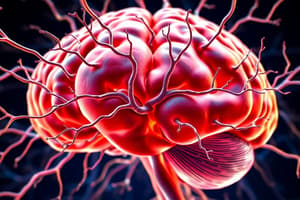Podcast
Questions and Answers
What is the main function of the autonomic nervous system?
What is the main function of the autonomic nervous system?
- Controls sensory processing
- Processes information from the brain
- Regulates voluntary muscle movements
- Regulates involuntary functions (correct)
The sympathetic nervous system promotes relaxation and recovery.
The sympathetic nervous system promotes relaxation and recovery.
False (B)
What is dopamine primarily involved in?
What is dopamine primarily involved in?
- Movement and reward (correct)
- Muscle memory
- Visual processing
- Regulating mood
The occipital lobe is primarily responsible for emotional and behavioral control.
The occipital lobe is primarily responsible for emotional and behavioral control.
What is the primary function of the cerebellum?
What is the primary function of the cerebellum?
What response does the sympathetic nervous system activate when faced with danger?
What response does the sympathetic nervous system activate when faced with danger?
What neurotransmitter is associated with mood regulation and appetite control?
What neurotransmitter is associated with mood regulation and appetite control?
The cerebrum is the smallest part of the brain involved in higher functions.
The cerebrum is the smallest part of the brain involved in higher functions.
The __________ is responsible for processing sensory information and controlling motor functions.
The __________ is responsible for processing sensory information and controlling motor functions.
What are the basic building blocks of the nervous system?
What are the basic building blocks of the nervous system?
Match the following components of the nervous system with their functions:
Match the following components of the nervous system with their functions:
After a good night's sleep, serotonin levels tend to ______.
After a good night's sleep, serotonin levels tend to ______.
During deep sleep, which part of the autonomic nervous system is dominant?
During deep sleep, which part of the autonomic nervous system is dominant?
What condition is related to low dopamine levels, affecting movement coordination?
What condition is related to low dopamine levels, affecting movement coordination?
The __________ nerve system controls voluntary movements and conveys sensory information.
The __________ nerve system controls voluntary movements and conveys sensory information.
Match the brain regions with their functions:
Match the brain regions with their functions:
Acetylcholine is primarily responsible for regulating winter sleep patterns.
Acetylcholine is primarily responsible for regulating winter sleep patterns.
The peripheral nervous system connects the brain and spinal cord to the rest of the body.
The peripheral nervous system connects the brain and spinal cord to the rest of the body.
Which neurotransmitter function is described?
Which neurotransmitter function is described?
What physiological changes occur when the sympathetic nervous system is activated?
What physiological changes occur when the sympathetic nervous system is activated?
Match the following neurotransmitters with their primary functions:
Match the following neurotransmitters with their primary functions:
The spinal cord connects the brain with the peripheral nervous system.
The spinal cord connects the brain with the peripheral nervous system.
The parietal lobe is responsible for processing ______ information.
The parietal lobe is responsible for processing ______ information.
What role do dendrites play in neurons?
What role do dendrites play in neurons?
Which neurotransmitter is primarily involved in muscle contraction and memory?
Which neurotransmitter is primarily involved in muscle contraction and memory?
Melatonin helps regulate the sleep-wake cycle and increases during exposure to light.
Melatonin helps regulate the sleep-wake cycle and increases during exposure to light.
What is the function of GABA in the nervous system?
What is the function of GABA in the nervous system?
When the sun sets, your body starts producing more ________, making you feel sleepy.
When the sun sets, your body starts producing more ________, making you feel sleepy.
Match the following substances with their primary role:
Match the following substances with their primary role:
Which of the following statements is true about endorphins?
Which of the following statements is true about endorphins?
The nature vs nurture debate centers solely on the role of genetics in behavior.
The nature vs nurture debate centers solely on the role of genetics in behavior.
What role do twin and adoption studies play in understanding behavior?
What role do twin and adoption studies play in understanding behavior?
Flashcards
Nervous System
Nervous System
The body's communication network, responsible for transmitting signals between different parts of the body and the brain.
Autonomic Nervous System
Autonomic Nervous System
Regulates involuntary functions like heartbeat, digestion, and breathing.
Sympathetic Nervous System
Sympathetic Nervous System
Activates the 'fight-or-flight' response, preparing the body for action or escape.
Parasympathetic Nervous System
Parasympathetic Nervous System
Signup and view all the flashcards
Central Nervous System
Central Nervous System
Signup and view all the flashcards
Spinal Cord
Spinal Cord
Signup and view all the flashcards
Peripheral Nervous System
Peripheral Nervous System
Signup and view all the flashcards
Brain
Brain
Signup and view all the flashcards
Cerebrum
Cerebrum
Signup and view all the flashcards
Cerebellum
Cerebellum
Signup and view all the flashcards
Brain Stem
Brain Stem
Signup and view all the flashcards
Somatic Nervous System
Somatic Nervous System
Signup and view all the flashcards
Neuron
Neuron
Signup and view all the flashcards
Neurotransmitters
Neurotransmitters
Signup and view all the flashcards
Synapse
Synapse
Signup and view all the flashcards
Acetylcholine
Acetylcholine
Signup and view all the flashcards
Temporal Lobe
Temporal Lobe
Signup and view all the flashcards
Gamma-Aminobutyric Acid (GABA)
Gamma-Aminobutyric Acid (GABA)
Signup and view all the flashcards
Nature Vs. Nurture
Nature Vs. Nurture
Signup and view all the flashcards
Twin and Adoption Studies
Twin and Adoption Studies
Signup and view all the flashcards
Epigenetics
Epigenetics
Signup and view all the flashcards
Melatonin
Melatonin
Signup and view all the flashcards
Endorphins
Endorphins
Signup and view all the flashcards
Dopamine
Dopamine
Signup and view all the flashcards
Serotonin
Serotonin
Signup and view all the flashcards
What is the Occipital Lobe responsible for?
What is the Occipital Lobe responsible for?
Signup and view all the flashcards
What is the Parietal Lobe responsible for?
What is the Parietal Lobe responsible for?
Signup and view all the flashcards
Spatial Processing
Spatial Processing
Signup and view all the flashcards
Depth Perception
Depth Perception
Signup and view all the flashcards
What is Object and Facial Recognition?
What is Object and Facial Recognition?
Signup and view all the flashcards
Study Notes
The Nervous System
- The nervous system is the body's communication network, controlling and coordinating all activities.
- It transmits signals between different parts of the body and the brain.
- It enables functions like sensation, movement, thought, and emotion.
Central Nervous System (CNS)
- The CNS processes sensory information, controls motor functions, and regulates vital functions like breathing and heartbeat.
- The brain is the control center for processing information.
- The spinal cord transmits signals between the brain and the body.
Peripheral Nervous System (PNS)
- The PNS connects the brain and spinal cord to the rest of the body for communication and coordination.
- It transmits sensory information from the body to the CNS.
- It sends motor commands from the CNS to muscles and glands.
- It regulates involuntary functions like heartbeat and digestion via the autonomic nervous system.
Autonomic Nervous System
- Regulates involuntary functions like heartbeat and digestion.
- The sympathetic nervous system activates the "fight-or-flight" response.
- The parasympathetic nervous system promotes relaxation and recovery.
Brain Regions
- The cerebrum is the largest part of the brain and is involved in higher functions like thinking, memory, and decision-making,
- The cerebellum is involved in motor coordination, balance, and cognitive functions.
- The brain stem connects the brain to the spinal cord and regulates basic physiological functions.
- The frontal lobe is responsible for decision-making, problem-solving, conscious thought, attention, emotional and behavioral control, speech production, personality, and intellect.
- The occipital lobe is responsible for visual processing and interpretation, visual data collection regarding color, motion and orientation, object and facial recognition, depth and distance perception, and visual world mapping.
- The parietal lobe is responsible for sensory information processing (touch, pressure, pain, position, vibration, temperature). It also processes spatial processing and spatial manipulation (navigating).
- The temporal lobe is responsible for language, speech formation, learning, memory, comprehension, hearing, and sound-to-visual image conversion.
Neurotransmitters
- Dopamine: Involved in reward, motivation, and movement.
- Serotonin: Regulates mood, appetite, and sleep.
- Acetylcholine: Involved in muscle movement and memory.
- GABA: Inhibitory neurotransmitter, helping calm the brain.
- Glutamate: Excitatory neurotransmitter, involved in learning and memory.
- Endorphins: The body's natural painkillers and mood enhancers, released during exercise or stress.
- Melatonin: Regulates the sleep-wake cycle.
Studying That Suits You
Use AI to generate personalized quizzes and flashcards to suit your learning preferences.




